The Friendly Fire Room Presents
Listen And See
Thank you Wanda Barlow for this great idea!
Genesis Framework Part 39
Genesis 3:22-23
Genesis Framework
GF 39 Genesis 3.23-24
June 5, 2016
Part 39
NKJ Genesis 3:23-24
…therefore the LORD God sent him out of the garden
of Eden to till the ground from which he was taken.
So He drove out the man; and He placed cherubim at the east of the garden of Eden, and a flaming sword which turned every way, to guard the way to the tree of life.
NKJ Genesis 3:23-24
…therefore the LORD God sent him out of the garden
of Eden to till the ground from which he was taken.
So He drove out the man; and He placed cherubim at the east of the garden of Eden, and a flaming sword which turned every way, to guard the way to the tree of life
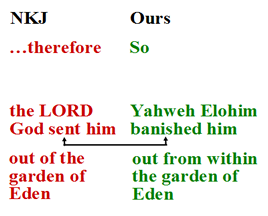
We are not forced to complete the sentence from previous verse.
The verb is piel-force, i.e. intensive active.
This is our old friend ![]() min at work, used
to expressing the idea
of separation or
removal from.
min at work, used
to expressing the idea
of separation or
removal from.
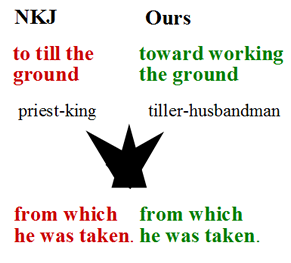
The preposition is of direction, not motion, implying a change of direction from the kind of work he had been doing, from being…
The implication is that of a strong reminder that the curse effectively reversed the original “order of consecration.”
Mankind was banished in four different ways,
(1) sent forth out from within the sanctuary garden,
(2) forced off away from the garden of Eden,
(3) relieved of his priestly responsibilities, and
(4) relegated to a whole new kind of existence in a hostile wilderness world.
He sent, He banished (piel) ![]() shal-ach'
shal-ach'
 “to press away from the wall”
“to press away from the wall”
![]() The staff was used for pushing as well as pulling.
The staff was used for pushing as well as pulling.
Action: to send
Concrete: a projectile, as a weapon discharged by the hand
The intensive (piel) adds the force of repulsion to an already pushy word.
This is the equivalent to the modern idea of “being fired”; the essential meaning being, to be forcefully discharged by the hand of an authority with an attitude of repulsion, toward a negative direction, and the expectation “not to return.”
Mankind was directed to a new kind of work.
A good translation is: “God banished mankind to work
(![]() `a-vad‘) of the ground”…
`a-vad‘) of the ground”…
![]() `a-vad‘
`a-vad‘  English: Obey
English: Obey
“looking after the family in weakness (head dangling)”
Action: to serve
Concrete: a servant
Abstract: service
The kind of work denoted is a work performed or made for another out of obligation or requirement.
Mankind was directed to a new kind of work.
A better translation is:
“God banished mankind to be a tiller of the soil”
Literally, “to be a servant of the soil,” in the sense that the the work of the servant is to till the soil and to care for it as a husbandman, so as to coerce the soil to produce something of benefit to man; otherwise the soil had lost the intention and the mandate to cooperate with mankind with regard to producing fruit.
NKJ Genesis 3:23-24
…therefore the LORD God sent him out of the garden
of Eden to till the ground from which he was taken.
So He drove out the man; and He placed cherubim at the east of the garden of Eden, and a flaming sword which turned every way, to guard the way to the tree of life.
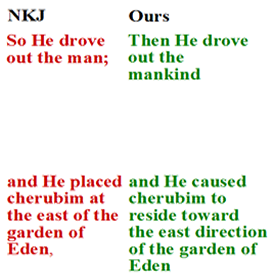
the same as Cain, Hagar, and as Pharaoh drove out all of the Hebrews after the loss of his son, and as God said He would do to the 6 nations of the promised land
The stationing of the cherubim and sword was a long-term deal, this became their place of dwelling.
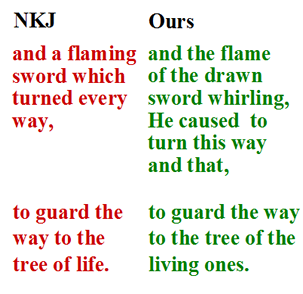
Later, the flame-colored veil and the sword of sacrifice would symbolize this, and guard the way into the holy of Holies.
The purpose was to block the way to life; later, Christ would be identified as the Way, the Truth, and the Life.
…an early reference to the doctrine of election.
He cast out (piel) ![]() ga-rash' the mankind
ga-rash' the mankind
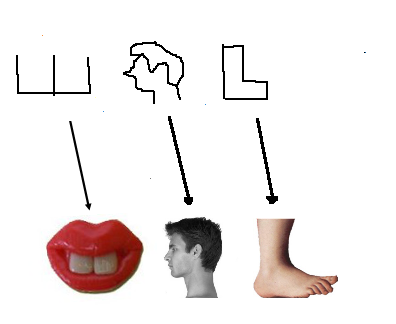
foot-man-pressed
Modern: they got the “boot”
He cast out (piel) ![]() ga-rash' the mankind
ga-rash' the mankind

foot-man-pressed
Action: to cast out
Concrete: a pasture
The quality-character denoted by this word speaks to the reader’s perspective from the standpoint of an already developed meaning of this word, in the sense that later the land surrounding a city would be typically described as inhabited by a lower class people and by outcasts.
This land was also covered with pastures for raising the flocks and herds of the city; so neither was it the best smelling community of all.
Whatever can be made of the meaning of “cast out”, it is intensified by the piel use; perhaps “cast away from.”
Original mankind had been “cast away from” two important aspects of daily life: the first subject was a radical change of man’s work and the benefits derived from it; the second subject was man’s community life was greatly downgraded along with the enrichment derived from it.
That experience would have been an extremely traumatic for mankind, to say the least.
NKJ Genesis 3:23-24
…therefore the LORD God sent him out of the garden
of Eden to till the ground from which he was taken.
More literally…
He caused to dwell from the eastern front of the garden cherubim and also a flame of the drawn sword whirling, turning this way and that, (caused ) hiphil- the subject causes the action of the verb but does not directly perform the act.
 to turn this way and that (implied: its capability to move
omni-directionally regardless of its east of Eden position)
to turn this way and that (implied: its capability to move
omni-directionally regardless of its east of Eden position)
Implication- There was only one way into the garden.
Implication:
Yahweh Elohim provided the defensive flame as a symbol of His glorious presence, not His actual Glory-Presence; and the motion of the sword was entirely self-propelled .
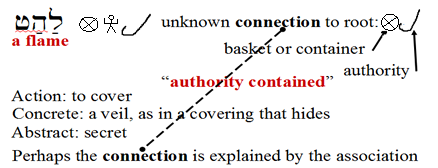 of the original flame of the sword with the later
flame-colored veil of the Holy of Holies... function of the flame ( To hide, to contain authority )
of the original flame of the sword with the later
flame-colored veil of the Holy of Holies... function of the flame ( To hide, to contain authority )
NKJ Exodus 26:31
“You shall make a veil woven of blue, purple, andscarlet thread, and fine woven linen. It shall be woven
with an artistic design of cherubim.”
NKJ Exodus 26:33
“And you shall hang the veil from the clasps. Then you
shall bring the ark of the Testimony in there, behind the
veil. The veil shall be a divider for you between the holy place and the Most Holy.”
NKJ Exodus 26:36
“You shall make a screen for the door of the tabernacle, woven of blue, purple, and scarlet thread, and fine
woven linen, made by a weaver.”
Summarize:
Fallen man was to continue to till the ground, though now outside the garden, no longer charged with the responsibility to guard the garden .
That responsibility was given to the cherubim to guard “the one way” to the tree of life with the help of the flaming sword.
The event of removing man from the garden marked the passage from the original normal state of beatitude under the Creator’s favor to the abnormal state of the world under the common curse, which had resulted from man’s rebellion against the covenant.
God had come in judgment to cleanse His temple, and to clear it of the apostate priests and the false god they had allowed to take a stand in the holy place.
From this point, even the former priests were regarded as potential intruders, so the sanctuary must be guarded by God’s agents of the Glory-Spirit.
The earth-world into which man was exiled, until the restoration of all things, had taken on the characteristics of a wilderness under the shadow of death, a place outside the holy land of promise.
The most dramatic visual we get of this wilderness is depicted by the prophet Ezekiel, as an image of a valley full of skeletons; and he sees restoration from exile as a resurrection from the dead.
Later we would see the image of the fiery sword and the cherubim, agents of the Glory-Spirit, depicted in the weave of the colorful veil before the holy of holies in Israel’s sanctuary, and the appearance of the altar sword of sacrifice.
For outcast Adam and Eve the only entrance into the holy
Presence in Eden was by way of the judgment sword of
the Glory-Spirit and His presence (![]() par-oo-see'-ah)
hosts.
par-oo-see'-ah)
hosts.
Only by a death-passage could access be gained to the tree of life.
It was this “way of the tree of life” of Genesis 3.24 that
was the original of “the way of the Cross” travelled by
Christ, “the way, the truth, and the life.”
Jesus is God Incarnate
In order to pay the debt of our sins, He came from Heaven, having been sent by the Father, where He lived a life of perfect obedience to the Father even unto the shameful death upon the cross in order to pay the debt of your sins.
This gift must be received by faith, believing that Jesus’ perfect life and Cross Work was His complete and necessary Atonement for your sins, in your behalf.
Faith is a gift that comes by the Power of God the Holy Spirit working in a person’s innermost being.
The Holy Spirit has the authority and power to quicken your dead spirit, to make it come to life.
If you have not done so before this moment, ask Jesus to forgive you your sins, tell Him you’ve stop trying to be your own savior, and ask Him to come into your life right now, and to give you eternal life.
Then, in faith believing, thank Him for the gift that He is giving you, the one He paid for in full in your place, in Jesus’ name, AMEN
Copyright June, 2016
Rev. Jim Craig
All Rights Reserved